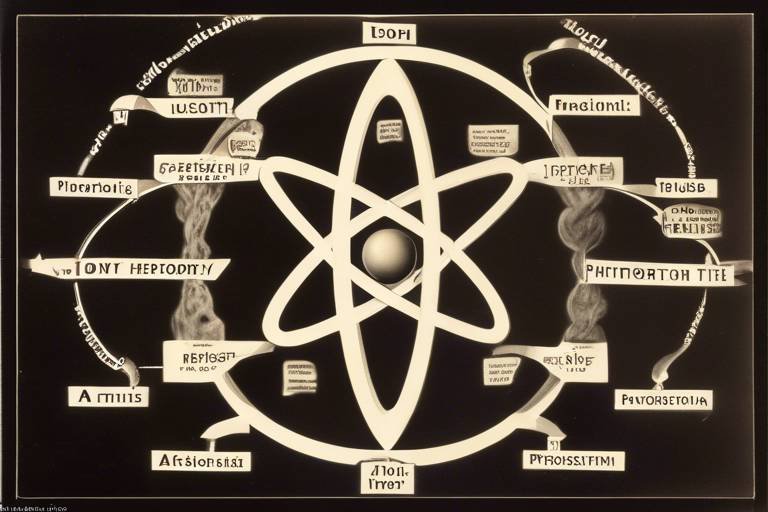Is Anthropocentrism Still Relevant in Environmental Ethics?
In an age where environmental crises loom large, the question of whether anthropocentrism—the belief that human beings are the most significant entities in the universe—remains relevant in environmental ethics is more pertinent than ever. As we grapple with the consequences of climate change, habitat destruction, and biodiversity loss, the ethical frameworks we adopt can profoundly influence our actions toward the planet. This article aims to explore the implications of anthropocentrism, its criticisms, and potential alternatives, all while considering the pressing ecological challenges we face today.
To understand the relevance of anthropocentrism, we must first delve into its historical roots. Emerging from a long tradition of philosophical thought, anthropocentrism has shaped our understanding of nature and our place within it. Historically, many cultures viewed the natural world as a resource for human use, leading to policies that prioritize human needs above all else. This perspective has influenced everything from land use to wildlife conservation, often at the expense of non-human life. The implications of this worldview are profound, as it can lead to a disconnect between humans and the environment, fostering a mindset where nature is merely a backdrop for human activity.
Despite its historical significance, anthropocentrism has faced substantial criticism. Detractors argue that this perspective undermines the intrinsic value of non-human life, treating animals and ecosystems as mere tools for human benefit. This raises ethical dilemmas in environmental decision-making, as policies driven by human interests often ignore the needs of the planet. For instance, when forests are cleared for agricultural expansion, the long-term consequences for biodiversity and ecosystem health are frequently overlooked. Critics contend that such actions not only harm the environment but also jeopardize the very resources humans depend on for survival. In this light, the question arises: can a worldview that places humans at the center truly address the complexities of our ecological crises?
In contrast to anthropocentrism, ecocentrism advocates for the inherent value of ecosystems and non-human entities. This perspective shifts the focus from human interests to the health and balance of the entire ecological community. Ecocentrism argues that all living beings, regardless of their utility to humans, possess intrinsic worth. This growing influence in environmental ethics is reshaping how we approach conservation and sustainability. By recognizing the interconnectedness of all life, ecocentrism encourages us to consider the broader implications of our actions on the environment.
Real-world examples illustrate how ecocentric ethics can lead to more sustainable practices. For instance, the rewilding movement, which aims to restore ecosystems to their natural state, prioritizes ecological balance over human interests. Projects like the Yellowstone to Yukon Conservation Initiative demonstrate how protecting large landscapes can benefit both wildlife and human communities. These initiatives highlight the potential for ecocentric ethics to foster a more harmonious relationship between humans and nature, proving that prioritizing ecological health can ultimately benefit society as a whole.
Despite its merits, ecocentrism faces significant challenges in implementation and acceptance. One major obstacle is the entrenched anthropocentric mindset prevalent in many societies. Changing this perspective requires not only shifts in policy but also in public consciousness. Additionally, economic interests often clash with ecocentric ideals, as industries prioritize short-term gains over long-term ecological sustainability. Overcoming these challenges necessitates a concerted effort to educate and engage communities about the importance of ecological health and the interconnectedness of all life forms.
Even in contemporary environmental policy, anthropocentric views continue to dominate. Legislation often prioritizes human interests, whether it be through resource extraction, land development, or economic growth. This focus can lead to policies that are detrimental to ecosystems, as seen in cases of overfishing or deforestation. The implications of this anthropocentric approach can be dire, as it perpetuates a cycle of exploitation that threatens both the environment and human well-being. To create effective environmental policies, it is crucial to recognize the limitations of an anthropocentric framework and explore more inclusive ethical perspectives.
Finding a middle ground between anthropocentrism and ecocentrism is essential for fostering a sustainable future. Strategies for integrating both perspectives in environmental ethics and policy-making can lead to more holistic solutions. For example, incorporating traditional ecological knowledge from indigenous communities can provide valuable insights into sustainable practices that honor both human and ecological needs. By embracing a more integrated approach, we can work towards policies that respect the rights of nature while also addressing human needs.
Blended ethical frameworks that consider both human and ecological health are vital in addressing the complexities of environmental issues. By recognizing the interconnectedness of all life forms, we can develop policies that promote sustainability without sacrificing human welfare. This integrated approach encourages collaboration among stakeholders, fostering a sense of shared responsibility for the planet. Ultimately, creating a more balanced ethical framework can help us navigate the challenges of environmental degradation while ensuring a healthier future for all.
As environmental challenges evolve, so too must our ethical frameworks. The future relevance of anthropocentrism may depend on its ability to adapt to the realities of a changing planet. Potential shifts towards more inclusive ethical perspectives, such as biocentrism or ecocentrism, may offer pathways for more sustainable practices. By embracing a broader understanding of our place in the natural world, we can foster a deeper connection to the environment and work towards solutions that benefit all living beings.
- What is anthropocentrism? Anthropocentrism is the belief that human beings are the most important entities in the universe, often leading to the prioritization of human needs over non-human life.
- Why is anthropocentrism criticized? Critics argue that anthropocentrism undermines the intrinsic value of non-human life and can lead to harmful environmental policies that disregard ecological health.
- What is ecocentrism? Ecocentrism is an ethical perspective that values ecosystems and non-human entities for their inherent worth, promoting the idea that all living beings are interconnected.
- How can we balance human and non-human interests? Finding a middle ground can involve integrating diverse ethical perspectives, including traditional ecological knowledge, to create policies that respect both human welfare and ecological health.

The Concept of Anthropocentrism
Anthropocentrism, a term that might sound a bit fancy, essentially means putting humans at the center of the universe—at least in terms of moral consideration. This perspective has deep historical roots, tracing back to ancient philosophies where humans were often viewed as the pinnacle of creation. Think of it as a lens through which we view our relationship with the environment: everything is valued based on its utility to humans. From the early days of human civilization, this viewpoint has influenced our ethical frameworks and environmental policies significantly.
Over time, anthropocentrism has shaped how we interact with nature. For instance, during the Industrial Revolution, this mindset fueled rampant exploitation of natural resources, as the focus was primarily on human advancement and economic growth. Forests were cleared, rivers were dammed, and wildlife was often seen as a mere backdrop to human activity. This relentless pursuit of progress led to environmental degradation, raising questions about the sustainability of such an approach.
To illustrate the impact of anthropocentrism, consider the following table that outlines its implications across various sectors:
| Sector | Implications of Anthropocentrism |
|---|---|
| Forestry | Deforestation for timber and agriculture, ignoring biodiversity loss. |
| Agriculture | Monoculture practices leading to soil depletion and loss of habitat. |
| Urban Development | Expansion into natural habitats, prioritizing human living space over ecosystems. |
As we delve deeper into the concept of anthropocentrism, it’s essential to recognize that this viewpoint isn't inherently negative. After all, it has propelled advancements in science, technology, and medicine that have improved human life significantly. However, the challenge arises when this human-centered mentality disregards the intrinsic value of non-human life and ecosystems.
In a world facing ecological crises—climate change, biodiversity loss, and pollution—it's crucial to question whether this anthropocentric approach still serves us well. Are we sacrificing the very systems that sustain us? This leads us to consider alternative perspectives, such as ecocentrism, which we will explore later. But for now, understanding anthropocentrism is key to grasping the ethical dilemmas we face in our environmental decision-making.
So, what does this mean for us today? It prompts a reflection on our values and priorities. Are we merely stewards of the planet for our benefit, or do we have a responsibility to protect and preserve the intricate web of life that exists beyond human interests?

Critiques of Anthropocentrism
As we dive deeper into the realm of environmental ethics, we can’t ignore the growing chorus of critiques aimed at anthropocentrism. Many argue that this human-centered worldview not only places us above other life forms but also diminishes the intrinsic value of non-human entities. It’s like giving a VIP pass to humanity while excluding the rest of the natural world from the conversation about moral consideration. This perspective raises significant ethical dilemmas, especially when it comes to decision-making in environmental policies.
One of the most compelling criticisms is that anthropocentrism fosters a sense of entitlement. When we view nature primarily as a resource for human consumption, we risk treating it as a mere backdrop to our existence. This utilitarian approach can lead to devastating consequences, such as habitat destruction, climate change, and the extinction of countless species. It’s as if we’re playing a game of Jenga with the ecosystem, removing blocks without considering the structural integrity of the tower. Eventually, that tower will collapse, and we’ll be left to pick up the pieces.
Moreover, critics assert that anthropocentrism can create a disconnect between humans and the natural world. When we prioritize human interests above all else, we often overlook our interdependence with other species and ecosystems. This disconnect can lead to a lack of empathy towards non-human life forms, making it easier for us to justify harmful actions against them. For instance, consider how factory farming practices often disregard the welfare of animals in favor of maximizing profit. This scenario illustrates how anthropocentric views can pave the way for ethical blind spots.
Additionally, anthropocentrism is criticized for its role in perpetuating social inequalities. The prioritization of human interests often aligns with the interests of the privileged, leaving marginalized communities and non-human entities voiceless. This raises an essential question: whose interests are we really serving when we make environmental decisions? Are we genuinely considering the well-being of all, or merely catering to a select few? This critique highlights the need for a more inclusive ethical framework that recognizes the value of all life forms.
In light of these critiques, some argue for a shift towards ecocentrism, which emphasizes the inherent value of ecosystems and non-human entities. By adopting an ecocentric perspective, we can create a more balanced approach to environmental ethics, one that acknowledges our interconnectedness with the natural world. However, transitioning from an anthropocentric to an ecocentric framework is not without its challenges, as we will explore in the following sections.
- What is anthropocentrism? Anthropocentrism is an ethical perspective that places humans at the center of moral consideration, often leading to the prioritization of human interests over those of non-human entities.
- Why is anthropocentrism criticized? Critics argue that it undermines the intrinsic value of non-human life, fosters entitlement, creates a disconnect with nature, and perpetuates social inequalities.
- What is ecocentrism? Ecocentrism is an alternative ethical framework that values ecosystems and non-human entities for their own sake, promoting a more holistic approach to environmental ethics.

Ecocentrism as an Alternative
Ecocentrism emerges as a compelling alternative to anthropocentrism, advocating for a worldview that recognizes the intrinsic value of all living beings and ecosystems. Unlike anthropocentrism, which places human needs and interests at the forefront, ecocentrism shifts the focus to the interconnections within the natural world. This perspective argues that every entity, whether a majestic redwood tree or a tiny insect, plays a critical role in maintaining the balance of our ecosystems. By embracing ecocentrism, we begin to see the environment not merely as a resource to exploit but as a complex web of life that deserves respect and protection.
One of the key tenets of ecocentrism is the idea that ecosystems possess their own rights and moral standing. This approach challenges the notion that human welfare should always take precedence, suggesting instead that our well-being is deeply intertwined with the health of the planet. For instance, consider the role of wetlands in flood control and water purification. By protecting these ecosystems, we not only safeguard countless species but also enhance our own quality of life. This interconnectedness highlights the importance of recognizing non-human entities as valuable stakeholders in environmental decision-making.
Ecocentrism is gaining traction in various fields, from conservation biology to environmental policy. Many organizations and movements are now advocating for laws that recognize the rights of nature. For example, in some regions, there have been legal efforts to grant rivers and forests legal personhood, allowing them to be represented in court. These initiatives illustrate a growing acknowledgment that protecting the environment is not just about preserving resources for future generations; it’s about respecting the rights of all beings that share our planet.
However, transitioning to an ecocentric worldview is not without its challenges. Many people find it difficult to let go of anthropocentric beliefs, often viewing nature primarily through the lens of human utility. This mindset can hinder the implementation of ecocentric principles in policy-making and everyday practices. To foster a more ecocentric approach, education plays a vital role in reshaping perceptions about nature. By cultivating a deeper understanding of ecological interdependence, we can inspire individuals and communities to embrace practices that prioritize ecological health.
In summary, ecocentrism offers a refreshing perspective that emphasizes the value of all life forms and ecosystems. It encourages us to rethink our relationship with nature, promoting a more holistic approach to environmental ethics. By recognizing that our survival is linked to the well-being of the planet, we can create a sustainable future that honors both human and non-human interests. As we navigate the complexities of environmental challenges, embracing ecocentrism may be the key to fostering a more harmonious coexistence with the natural world.

Case Studies in Ecocentric Ethics
When we talk about ecocentric ethics, it's not just a theoretical concept; it manifests in real-world applications that illustrate its power and necessity. One remarkable example is the reforestation initiatives in Costa Rica. Here, the government has implemented policies that not only prioritize the restoration of forest ecosystems but also recognize the intrinsic value of nature. This approach has led to a significant increase in biodiversity, showcasing how ecocentric principles can lead to a healthier planet while simultaneously benefiting local communities through eco-tourism and sustainable agriculture.
Another compelling case study can be found in New Zealand's Whanganui River, which has been granted legal personhood. This landmark decision acknowledges the river as a living entity with rights, thus shifting the focus from a purely human-centric view to one that respects the ecological integrity of the river itself. This legal framework empowers the local Māori community to advocate for the river's health, ensuring that decisions regarding its use are made with the river's well-being in mind.
In the realm of conservation, the Yellowstone to Yukon Conservation Initiative stands out as a prime example of ecocentric ethics in action. This initiative aims to create a connected ecosystem across the two regions, allowing wildlife to migrate freely and thrive. By prioritizing ecological health over individual landowner interests, the initiative underscores the importance of viewing ecosystems holistically. It serves as a reminder that when we respect the interconnectedness of life, we can create sustainable solutions that benefit both humans and non-human entities.
However, it’s essential to recognize that these case studies also face challenges. For instance, the implementation of ecocentric ethics often requires overcoming deeply entrenched anthropocentric views that dominate policy-making. Moreover, there can be economic implications for communities that have traditionally relied on resource extraction. Balancing these interests is crucial for the success of ecocentric initiatives. As we reflect on these examples, it becomes clear that the path to a more sustainable future involves embracing and advocating for ecocentric ethics, demonstrating that when we prioritize the health of our planet, we ultimately enhance our own well-being.
- What is ecocentrism? Ecocentrism is an environmental ethic that places intrinsic value on ecosystems and non-human entities, advocating for their rights and health.
- How does ecocentrism differ from anthropocentrism? While anthropocentrism prioritizes human interests, ecocentrism emphasizes the importance of all living beings and the interconnectedness of life.
- Can ecocentric ethics be integrated into current policies? Yes, integrating ecocentric principles into policies can lead to more sustainable practices that benefit both the environment and human communities.

Challenges to Ecocentrism
While ecocentrism presents a compelling alternative to anthropocentrism, it is not without its challenges. One of the most significant hurdles is the cultural resistance to shifting away from a human-centered worldview. Many societies have long operated under the belief that human beings are the pinnacle of existence, leading to a deep-seated reluctance to embrace the idea that non-human entities possess intrinsic value. This cultural inertia can manifest in various ways, from public policy to personal beliefs, making it difficult to advocate for ecocentric principles effectively.
Moreover, there exists a practical challenge in implementing ecocentric policies. For instance, consider a scenario where a government needs to decide between developing a new housing project or preserving a natural habitat. The economic incentives tied to human development often outweigh the perceived benefits of protecting ecosystems in the eyes of policymakers. This dilemma highlights the ongoing tension between immediate human needs and long-term ecological health, often leading to decisions that favor anthropocentric interests.
Additionally, ecocentrism faces conceptual challenges in defining what constitutes the "value" of non-human entities. How do we measure the worth of a forest, a river, or an endangered species? Unlike economic metrics that can easily quantify human benefits, ecological value is often nebulous and subjective. This ambiguity can lead to difficulties in gaining widespread support for ecocentric initiatives, as stakeholders may struggle to see the tangible benefits of prioritizing ecological health over human interests.
Furthermore, there is the challenge of interconnectedness. Ecosystems are complex and interdependent, meaning that changes in one area can have ripple effects throughout the entire system. For example, protecting a single species may inadvertently impact local human communities that rely on those species for their livelihoods. This interconnectedness complicates the implementation of ecocentric ethics, as it requires a holistic understanding of both ecological and human systems. Stakeholders must navigate these complexities, often leading to conflicts that can undermine ecocentric initiatives.
Lastly, the economic implications of adopting ecocentric principles cannot be overlooked. Many industries, such as agriculture, forestry, and fishing, are deeply entrenched in anthropocentric practices that prioritize short-term gains. Transitioning to more sustainable practices often requires significant investment and may initially disrupt local economies. This economic resistance can create a significant barrier to the adoption of ecocentric ethics, as communities may fear the loss of jobs and income associated with more environmentally friendly practices.
In summary, while ecocentrism offers a refreshing perspective on environmental ethics, it faces a myriad of challenges that must be addressed for it to gain traction. From cultural resistance and practical implementation issues to conceptual ambiguities and economic implications, the journey toward a more ecocentric worldview is fraught with obstacles. However, recognizing these challenges is the first step in overcoming them, paving the way for a more sustainable and equitable future.
- What is ecocentrism? Ecocentrism is an ethical perspective that places intrinsic value on ecosystems and non-human entities, advocating for their protection and preservation.
- How does ecocentrism differ from anthropocentrism? While anthropocentrism prioritizes human interests and welfare, ecocentrism emphasizes the interconnectedness and inherent value of all living beings and their habitats.
- What are some examples of ecocentric practices? Ecocentric practices include sustainable agriculture, wildlife conservation efforts, and policies aimed at restoring natural habitats.
- Why is there resistance to ecocentrism? Resistance often stems from cultural beliefs that prioritize human needs, practical challenges in implementation, and economic implications for industries reliant on anthropocentric practices.
- Can ecocentrism coexist with human development? Yes, finding a balance between ecocentric principles and human development is crucial for sustainable progress, and integrated approaches can help achieve this balance.

Anthropocentrism in Policy Making
When we look at the landscape of environmental policy, it's hard to ignore the profound influence of anthropocentrism. This perspective, which places humans at the pinnacle of moral consideration, has not only shaped our ethical frameworks but has also deeply embedded itself into the fabric of policy-making processes. From legislation that prioritizes economic growth over ecological health to conservation efforts that primarily serve human interests, the anthropocentric viewpoint often dictates the direction of environmental initiatives.
Consider this: policies are often designed with a focus on how environmental changes will affect human welfare, rather than recognizing the intrinsic value of the natural world. For instance, when governments make decisions about land use, they frequently weigh the potential for economic development against environmental preservation. This leads to a scenario where natural habitats are sacrificed for urban expansion or resource extraction, all justified by the promise of human benefit. The underlying assumption is that the needs and desires of people should always come first, which raises significant ethical questions. Are we truly justified in prioritizing our interests above those of other living beings?
Moreover, anthropocentrism can create a narrow view of environmental stewardship. It often leads to policies that treat nature merely as a resource for human exploitation. This can be seen in practices such as:
- Deforestation for agriculture or urban development
- Overfishing that depletes marine ecosystems
- Pollution control measures that focus on human health rather than ecosystem integrity
These examples highlight a critical flaw: when we view the environment solely through an anthropocentric lens, we risk overlooking the complex interdependencies that sustain life on Earth. The result? Environmental degradation that ultimately threatens our own survival. The challenge lies in recognizing that a healthy ecosystem is not just beneficial for humans; it is essential for the planet's overall health.
In response to these concerns, there is a growing call for policies that integrate ecocentric principles, promoting a more holistic approach to environmental governance. This shift involves rethinking how we define value in the context of nature and recognizing that non-human entities also have a right to exist and thrive. Policymakers are beginning to explore frameworks that balance human needs with ecological health, fostering a more sustainable relationship between society and the environment.
As we move forward, it is crucial for policymakers to engage with diverse ethical perspectives, including ecocentrism, to create more inclusive and effective environmental policies. This means not only considering the immediate human benefits of policy decisions but also evaluating their long-term impacts on ecosystems and biodiversity. By doing so, we can work towards a future where environmental ethics are not just an afterthought but a guiding principle in the decision-making process.
Q: What is anthropocentrism?
A: Anthropocentrism is an ethical viewpoint that places humans at the center of moral consideration, often prioritizing human interests over those of other living beings and ecosystems.
Q: Why is anthropocentrism criticized in environmental ethics?
A: Critics argue that anthropocentrism undermines the intrinsic value of non-human life and can lead to environmental degradation by prioritizing human needs at the expense of ecological health.
Q: What is ecocentrism?
A: Ecocentrism is an alternative ethical perspective that recognizes the inherent value of ecosystems and non-human entities, promoting a more balanced approach to environmental decision-making.
Q: How can policymakers balance human and non-human interests?
A: Policymakers can adopt integrated approaches that consider both human needs and ecological health, fostering sustainable practices that benefit both people and the planet.

Balancing Human and Non-Human Interests
Finding a balance between human and non-human interests is not just a noble goal; it's essential for the sustainability of our planet. As we navigate the complexities of environmental ethics, we often find ourselves at a crossroads, where the needs of humanity collide with the rights of nature. Imagine a seesaw, with humans on one side and the environment on the other. If one side is too heavy, the entire system tips over. Striking this balance requires thoughtful consideration and innovative approaches that integrate both perspectives.
One of the biggest challenges we face is that traditional policies often prioritize human needs, frequently at the expense of ecosystems. This anthropocentric view can lead to short-term gains but poses long-term risks to ecological health. So, how do we shift this paradigm? It starts with recognizing that human well-being is intrinsically linked to the health of our planet. For instance, clean air and water, fertile soil, and biodiversity are not just luxuries; they are necessities for our survival. By acknowledging this interdependence, we can create policies that reflect a more holistic understanding of our place in the world.
To effectively balance these interests, we can adopt a few strategies:
- Inclusive Decision-Making: Engaging diverse stakeholders, including indigenous communities, environmentalists, and scientists, can provide a broader perspective on how to manage natural resources sustainably.
- Interdisciplinary Approaches: Combining insights from ecology, sociology, and economics can lead to more comprehensive solutions that benefit both humans and the environment.
- Long-Term Planning: Policies should focus on sustainability rather than short-term profits. This means investing in renewable energy, conservation efforts, and sustainable agriculture.
Moreover, education plays a pivotal role in fostering a culture that values both human and non-human interests. When people understand the importance of biodiversity and ecosystem services, they are more likely to support policies that protect these vital components of our planet. Schools, communities, and organizations can collaborate to raise awareness and promote stewardship of the environment.
Ultimately, the goal is to create a framework where both human and ecological needs are met, leading to a more sustainable future. This balance is not merely an ideal; it's a necessity for the survival of all species on Earth. By embracing an integrated approach to environmental ethics, we can pave the way for a world where harmony between humanity and nature is not just possible, but achievable.
- What is the importance of balancing human and non-human interests? Balancing these interests is crucial for sustainable development, ensuring that both human needs and ecological health are prioritized.
- How can we achieve this balance in policy-making? By adopting inclusive decision-making processes, interdisciplinary approaches, and focusing on long-term sustainability.
- Why should we consider non-human interests in our ethical frameworks? Non-human interests contribute to the overall health of ecosystems, which in turn supports human well-being.

Integrated Approaches to Ethics
In the complex world of environmental ethics, the need for integrated approaches has never been more pressing. As we grapple with issues like climate change, biodiversity loss, and pollution, it becomes clear that a single perspective—be it anthropocentric or ecocentric—may not suffice. Instead, we must embrace a more holistic view that acknowledges the interconnectedness of human and non-human interests. This means recognizing that our actions impact not only ourselves but also the intricate web of life that sustains us.
Imagine trying to solve a puzzle with only half the pieces. That’s what it feels like when we limit our ethical considerations to just one perspective. By integrating various ethical frameworks, we can create a more comprehensive approach to environmental issues. For instance, blending anthropocentrism’s focus on human welfare with ecocentrism’s emphasis on the intrinsic value of nature allows us to develop solutions that are both pragmatic and ethical. This dual approach can lead to policies that not only protect the environment but also promote human well-being.
One effective strategy for integrating these perspectives is through collaborative decision-making. Involving diverse stakeholders—including scientists, policymakers, local communities, and environmental activists—ensures that multiple viewpoints are considered. This approach not only enriches the discussion but also fosters a sense of shared responsibility. When people feel like they have a stake in the outcome, they are more likely to support sustainable practices.
Moreover, educational initiatives can play a crucial role in promoting integrated ethics. By teaching individuals about the value of both human and ecological systems, we can cultivate a generation that appreciates the balance between the two. For example, environmental education programs that highlight the importance of biodiversity alongside human health can inspire students to think critically about their choices and the broader implications of their actions.
Ultimately, the goal of integrated approaches to ethics is to create a sustainable future where both human and non-human interests are respected. This requires a shift in mindset—moving away from viewing nature as merely a resource for human exploitation and towards seeing it as a partner in our survival. As we look to the future, it’s essential to remember that our well-being is intricately linked to the health of the planet. By fostering an ethic that values both, we can pave the way for more effective and equitable environmental policies.
- What is integrated environmental ethics? Integrated environmental ethics combines various ethical perspectives, such as anthropocentrism and ecocentrism, to address complex environmental issues more holistically.
- Why is collaboration important in environmental decision-making? Collaboration ensures that diverse viewpoints are considered, leading to more balanced and effective solutions that benefit both humans and the environment.
- How can education promote integrated ethics? Educational initiatives can raise awareness about the interconnectedness of human and ecological systems, fostering a sense of responsibility towards both.

Future Directions in Environmental Ethics
As we navigate the complexities of the 21st century, the realm of environmental ethics is poised for significant evolution. The challenges we face, from climate change to biodiversity loss, necessitate a re-examination of our ethical frameworks. The traditional anthropocentric view, which places humans at the center of moral consideration, is increasingly being scrutinized. Are we ready to embrace a more inclusive approach that considers the rights and values of non-human entities?
One potential future direction is the integration of interdisciplinary perspectives. By combining insights from philosophy, ecology, sociology, and economics, we can develop a more holistic understanding of environmental issues. This approach encourages collaboration among various stakeholders, including scientists, ethicists, policymakers, and local communities. Imagine a world where decisions about land use and resource management are made not just with human interests in mind, but with a comprehensive understanding of ecological interdependencies. This could lead to more sustainable practices that benefit both people and the planet.
Moreover, the rise of technology in environmental management presents new ethical dilemmas and opportunities. For instance, advancements in artificial intelligence and data analytics can enhance our ability to monitor ecosystems and predict environmental changes. However, this also raises questions about privacy, data ownership, and the potential for misuse. How do we ensure that technology serves the greater good without compromising ethical standards? As we move forward, it's essential to establish ethical guidelines that govern the use of technology in environmental decision-making.
Another noteworthy trend is the increasing recognition of indigenous knowledge in environmental ethics. Indigenous communities have long practiced sustainable living and have a profound understanding of their local ecosystems. Integrating this knowledge into contemporary environmental policies can offer valuable insights and solutions. This collaboration not only respects the rights of indigenous peoples but also enriches our ethical frameworks by incorporating diverse worldviews. It’s like adding a new color to a palette, creating a more vibrant and comprehensive picture of how to coexist with nature.
As we look to the future, we must also consider the role of education in shaping environmental ethics. Educating future generations about the importance of ecological balance and ethical considerations can foster a culture of sustainability. Schools and universities should emphasize not just the scientific aspects of environmental issues but also the ethical implications. By cultivating a sense of responsibility towards the environment, we can empower young people to become advocates for change.
In summary, the future of environmental ethics is likely to be characterized by a shift towards more inclusive and integrated frameworks. This evolution will require us to challenge traditional anthropocentric views and embrace a broader perspective that values all forms of life. As we address the pressing environmental challenges of our time, we must remain open to new ideas and approaches that prioritize both human and non-human interests.
- What is environmental ethics? Environmental ethics is a branch of philosophy that explores the moral relationship between humans and the environment, considering the rights of non-human entities.
- How does anthropocentrism differ from ecocentrism? Anthropocentrism prioritizes human interests, while ecocentrism values ecosystems and non-human life as having inherent worth.
- Why is interdisciplinary collaboration important in environmental ethics? It allows for a more comprehensive understanding of environmental issues, combining various perspectives and expertise to create sustainable solutions.
- What role does technology play in future environmental ethics? Technology can enhance our ability to monitor and manage ecosystems, but it also raises ethical concerns regarding its use and implications.
- How can education influence environmental ethics? By teaching the importance of sustainability and ethical considerations, education can empower future generations to advocate for responsible environmental practices.
Frequently Asked Questions
- What is anthropocentrism?
Anthropocentrism is an ethical framework that places humans at the center of moral consideration. It suggests that human interests and values are the most important, often leading to policies that prioritize human needs over ecological concerns.
- Why is anthropocentrism criticized in environmental ethics?
Critics argue that anthropocentrism diminishes the intrinsic value of non-human life, which can lead to environmental degradation. This perspective often overlooks the rights and importance of ecosystems and other species, raising ethical dilemmas in decision-making processes.
- What is ecocentrism?
Ecocentrism is an alternative ethical perspective that posits ecosystems and non-human entities have inherent value. It emphasizes the importance of ecological balance and aims to protect the environment for its own sake, not just for human benefit.
- Can you give examples of ecocentric ethics in action?
Yes! There are numerous case studies where ecocentric ethics have led to sustainable practices. For instance, initiatives that focus on habitat restoration and biodiversity conservation prioritize ecological health over human interests, showcasing successful outcomes.
- What challenges does ecocentrism face?
Despite its advantages, ecocentrism faces challenges in terms of acceptance and implementation. Many policymakers and the public may resist shifting away from anthropocentric views due to economic interests, cultural beliefs, or lack of awareness about ecological issues.
- How does anthropocentrism influence environmental policy?
Anthropocentrism continues to dominate environmental policy-making, often resulting in legislation that prioritizes human needs. This can lead to short-term solutions that neglect long-term ecological health, raising concerns about sustainability.
- Is it possible to balance human and non-human interests?
Absolutely! Finding a middle ground between anthropocentrism and ecocentrism is crucial. Strategies like integrated approaches to ethics can help harmonize human needs with ecological health, fostering a more sustainable future.
- What does the future hold for environmental ethics?
As environmental challenges evolve, our ethical frameworks must adapt. There may be a shift towards more inclusive perspectives that consider both human and ecological interests, paving the way for innovative solutions to pressing environmental issues.



















